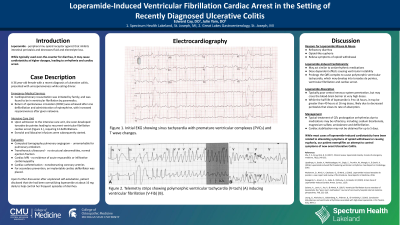Back


Poster Session A - Sunday Afternoon
Category: IBD
A0409 - Loperamide-Induced Ventricular Fibrillation Cardiac Arrest in the Setting of Recently Diagnosed Ulcerative Colitis
Sunday, October 23, 2022
5:00 PM – 7:00 PM ET
Location: Crown Ballroom

Has Audio

Edward Cay, DO
Spectrum Health Lakeland
St. Joseph, MI
Presenting Author(s)
Edward Cay, DO1, Julie Yam, DO2
1Spectrum Health Lakeland, St. Joseph, MI; 2Great Lakes Gastroenterology, St. Joseph, MI
Introduction: Loperamide is a peripheral mu opioid receptor agonist that inhibits intestinal peristalsis and decreases fluid and electrolyte loss. While typically used over-the-counter for diarrhea, it may cause cardiotoxicity at higher dosages, leading to arrhythmia and cardiac arrest.
Case Description/Methods: A 36 year-old female with a recent diagnosis of ulcerative colitis, presented with unresponsiveness while eating dinner. Cardiopulmonary resuscitation was initiated by family, found to be in ventricular fibrillation by paramedics. Return of spontaneous circulation was achieved after one defibrillation and administration of epinephrine. Upon admission to the intensive care unit, she developed torsades de pointes leading to recurrent ventricular fibrillation cardiac arrest, requiring 12 defibrillations and subsequent esmolol and lidocaine infusions. Computed tomography pulmonary angiogram was unremarkable for pulmonary embolism, and transthoracic ultrasound revealed no structural abnormalities. Cardiac MRI had no evidence of acute myocarditis or infiltrative cardiomyopathy. Cardiac catheterization revealed nonobstructing coronary arteries. For secondary prevention, an implantable cardiac defibrillator was placed. Upon further discussion after unplanned self-extubation, patient disclosed that she had been overutilizing loperamide at about 16 mg daily to help control her frequent episodes of diarrhea.
Discussion: Loperamide may act similar to antiarrhythmic medications, with dose dependent effects causing ventricular instability. Blockage of sodium channels prolongs the QRS complex causing polymorphic ventricular tachycardia, which may develop into torsades de pointes, ventricular fibrillation and cardiac arrest.
Loperamide may be dosed over-the-counter up to 8 mg per day. While the half-life of loperamide is 9 to 14 hours, it may be greater than 40 hours at 16 mg doses, likely due to decreased peristalsis that slows its rate of absorption.
Typical management of QTc prolongation arrhythmias due to medications may be refractory in loperamide-induced cardiotoxicity, including sodium bicarbonate, magnesium sulfate, amiodarone and defibrillation. Cardiac stabilization may not be obtained for up to 5 days.
While most cases of loperamide-induced cardiotoxicity have been related to alleviating symptoms of opioid withdrawal or causing euphoria, our patient exemplifies an attempt to control symptoms of new onset Ulcerative Colitis.

Disclosures:
Edward Cay, DO1, Julie Yam, DO2. A0409 - Loperamide-Induced Ventricular Fibrillation Cardiac Arrest in the Setting of Recently Diagnosed Ulcerative Colitis, ACG 2022 Annual Scientific Meeting Abstracts. Charlotte, NC: American College of Gastroenterology.
1Spectrum Health Lakeland, St. Joseph, MI; 2Great Lakes Gastroenterology, St. Joseph, MI
Introduction: Loperamide is a peripheral mu opioid receptor agonist that inhibits intestinal peristalsis and decreases fluid and electrolyte loss. While typically used over-the-counter for diarrhea, it may cause cardiotoxicity at higher dosages, leading to arrhythmia and cardiac arrest.
Case Description/Methods: A 36 year-old female with a recent diagnosis of ulcerative colitis, presented with unresponsiveness while eating dinner. Cardiopulmonary resuscitation was initiated by family, found to be in ventricular fibrillation by paramedics. Return of spontaneous circulation was achieved after one defibrillation and administration of epinephrine. Upon admission to the intensive care unit, she developed torsades de pointes leading to recurrent ventricular fibrillation cardiac arrest, requiring 12 defibrillations and subsequent esmolol and lidocaine infusions. Computed tomography pulmonary angiogram was unremarkable for pulmonary embolism, and transthoracic ultrasound revealed no structural abnormalities. Cardiac MRI had no evidence of acute myocarditis or infiltrative cardiomyopathy. Cardiac catheterization revealed nonobstructing coronary arteries. For secondary prevention, an implantable cardiac defibrillator was placed. Upon further discussion after unplanned self-extubation, patient disclosed that she had been overutilizing loperamide at about 16 mg daily to help control her frequent episodes of diarrhea.
Discussion: Loperamide may act similar to antiarrhythmic medications, with dose dependent effects causing ventricular instability. Blockage of sodium channels prolongs the QRS complex causing polymorphic ventricular tachycardia, which may develop into torsades de pointes, ventricular fibrillation and cardiac arrest.
Loperamide may be dosed over-the-counter up to 8 mg per day. While the half-life of loperamide is 9 to 14 hours, it may be greater than 40 hours at 16 mg doses, likely due to decreased peristalsis that slows its rate of absorption.
Typical management of QTc prolongation arrhythmias due to medications may be refractory in loperamide-induced cardiotoxicity, including sodium bicarbonate, magnesium sulfate, amiodarone and defibrillation. Cardiac stabilization may not be obtained for up to 5 days.
While most cases of loperamide-induced cardiotoxicity have been related to alleviating symptoms of opioid withdrawal or causing euphoria, our patient exemplifies an attempt to control symptoms of new onset Ulcerative Colitis.

Figure: Figure 1. Telemetry strips showing polymorphic ventricular tachycardia (A) inducing ventricular fibrillation (B).
Disclosures:
Edward Cay indicated no relevant financial relationships.
Julie Yam indicated no relevant financial relationships.
Edward Cay, DO1, Julie Yam, DO2. A0409 - Loperamide-Induced Ventricular Fibrillation Cardiac Arrest in the Setting of Recently Diagnosed Ulcerative Colitis, ACG 2022 Annual Scientific Meeting Abstracts. Charlotte, NC: American College of Gastroenterology.

